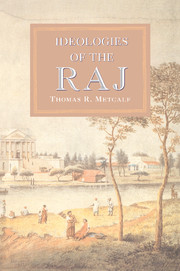4 - The ordering of difference
Published online by Cambridge University Press: 28 March 2008
Summary
The strategies devised by the British to comprehend India were never simply intellectual exercises, nor were they meant only in some general way to justify British rule over the subcontinent. Always these theories, whether of race or gender, of an unchanging or of a feudal India, found meaning as they were used to order India’s peoples and their past. Through them what the British conceived of as India’s enduring difference was given shape in administrative practice. This process of ordering India was not driven wholly by political objectives. It was also part of the larger Enlightenment endeavour, by observation and study, to understand the world outside Europe, as Europeans came to know it more fully. A relentless need to count and classify everything they encountered defined much Victorian intellectual activity. For the most part too, as they set out to order the peoples who inhabited their new Indian dominion, the British sought to fit the categories they used to the society they purported to describe. Indeed, Indians themselves, especially the Brahmin informants and assistants who worked with the British, by the information they provided shaped much of the ethnographic project. Still, under the Raj the knowledge the British amassed can not be separated from its role in the successful working of colonial rule. India was ‘known’ in ways that would sustain a system of colonial authority, and through categories that made it fundamentally different from Europe.
The theories of ‘difference’ the British devised, as we have seen, despite their claims to scientific precision, were never wholly coherent, nor were they free of internal contradiction. As they were deployed by India’s colonial administrators, these contradictions became ever more difficult to contain. Often mutually inconsistent theories were cobbled together to achieve particular political purposes, and controversy frequently erupted over how best to fit the ungainly facts of India’s social order into the ’proper’ modes of explanation. Inevitably, the endeavour to create a coherent social order involved the creation everywhere of what could only be called ’exceptions’.
- Type
- Chapter
- Information
- Ideologies of the Raj , pp. 113 - 159Publisher: Cambridge University PressPrint publication year: 1995
References
- 2
- Cited by

